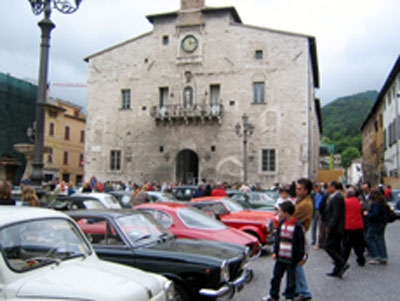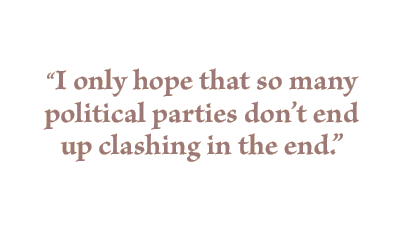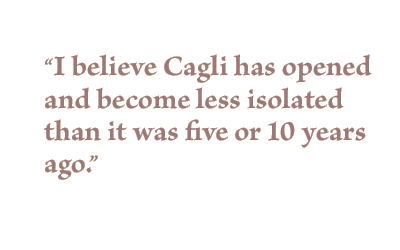 |
|
Hidden within La Regione Marche mountains of Italy, the 10,000
Cagliesi are aware when foreigners enter the small town. According
to Franco Clementi, once an employee for the Cagli city hall,
tourism rose by a considerable number in 2003.
Franco's positive attitude toward Cagli tourism stands out in
contrast to his attitude towards the "disaster" he calls
the European Union. "It is a disaster; it is not beneficial
to Italy. The Italian economy is going down, and it is even worse
for southern Italy. Our large pensions are now lower," Franco
explained.
Fabio Faggiani, owner of Feluca Viaggi, Cagli's local tourist
office, explained the causes for such a noticeable increase in
tourism. The rise of tourists entering Cagli can actually be associated
with the European Union, in addition to the local political administrations
and those employed in tourism such as tour operators and in travel
agencies.
Faggiani has been employed at Feluca Viaggi for the past 12 years.
He began as an employee and worked his way up in the business.
Faggiani slowly bought small parts of the business as a hired
employee and eventually became a full owner. There are current
plans to have the office fully renovated and doubled in size.
|
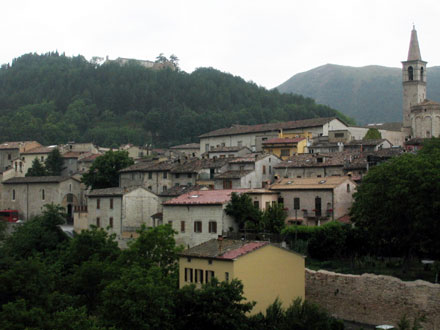 |
| |
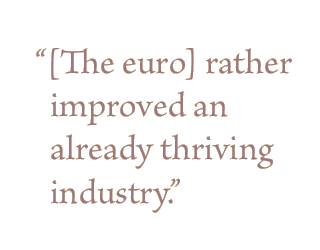 |
Feluca Viaggi can be found on Via Leopardi, only a few meters
outside the central piazza in Old Cagli. Its location, just
beside City Hall, attracts many Cagliesi in search of travel
assistance. Approximately 80 percent of Faggiani's business
is made up of clients in search of vacation spots. Only
20 percent of his clients are business travelers.
When asked which locations his clients are interested
in, Faggiani points to the large world map pinned to the
wall behind his desk: the European attractions first, such
as Spain and the Greek Isles, then New York and California.
Faggiani added that Canada and the Caribbean islands are
in demand as well. Recently a group of young Cagliesi adults
left for Jamaica. Their excitement was apparent as they
said goodbye to friends in the local wine bar, Caffe del
Corso, on the night of their departure. Regarding the Cagliesi
youths’ interest in leaving the town, Faggiani said
"The young people of Cagli want to know the world from
their own eyes, not just passively from the television."
Antonio Mansi, a Cagliesi teenager, appreciates the advantages
of joining the European Union. “Cultural exchanges
grew also; I went to Denmark and the Czech Republic,”
said Mansi.
|
|
Faggiani denied the existence of a direct correlation between
the introduction of the euro in 2002 and an increase in
tourism. "I am not saying that it didn't affect the
tourism business; rather it improved an already thriving
industry," Faggiani said. He commented that the euro
has not had any direct negative affects on the tourism industry.
Now that many currencies have been replaced by the euro,
travelers can go from country to country without converting
money or paying extra fees.
"All the countries are now competing on the same currency.
Therefore promotions within the tourism industry have strengthened
in order to contend in this prosperous business," said
Faggiani.
How does Cagli compete in this industry? The answer lies
in not only what Faggiani attributed to the local political
administration and tour operators, but an association known
as a consorzio.
For the past four years, Faggiani has been the president
of the consorzio, Comunita Montana Catria-Nerone, a subset
group from a larger association known as Consorzio Monte
Feltro Leader. The concept of this program is to assist
a variety of establishments, such as bed and breakfasts,
hotels, restaurants, and bars, by treating them as one entity
that will thrive on tourism.
The comuni or related towns that make up the Comunita Montana
Catria-Nerone are Cagli, Cantiano, Apecchio, Piobbico, and
Acqualagna. Faggiani explained that the consorzio is not
meant to advertise Cagli alone, but rather the three other
comuni as well. Cagli is one small sector of these mountain
comuni, where multiple consorzi create a broader offer to
the market.
According to Faggiani, the mountain comuni are advertised
mainly as a package, with complementary attributes, each
containing their own distinct local flavor. |
|
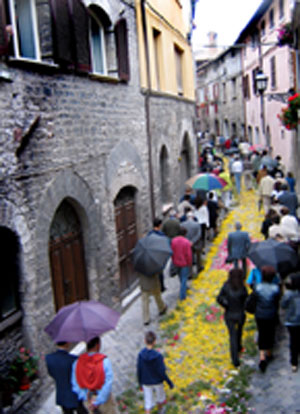 |
Yet Cagli has notable key attributes. "Cagli contains a relaxing atmosphere,
nature untouched by man, unpolluted rivers perfect for bathing
and a rich, ancient culture," Faggiani said. Among
other regions, unique handcrafts like iron and ceramics
are made locally for tourists to admire as well as purchase.
Agricultural products such as wine and truffles are important
for Cagli. Not only can visitors purchase them directly,
but restaurants and other food related businesses can benefit
as well. An enjoyable and relaxing vacation may only require
a summer evening within the heart of the Marche, sipping
local wines and feasting on regional cuisine.
"We have already done so much for the aesthetics of
Cagli, including the present building renovations that are
currently apparent all throughout town." Faggiani explained.
Notable within Cagli is the concentration on renovating
the old. Saving the historical buildings from the wear of
time illustrates Cagli's determination to preserve its rich
architecture.
Cagli expects more funding in the near future. "More
organization among the town is needed now that the aesthetics
are taken care of," Faggiani said. Among the plans
for assisting the city’s tourism are professional
guides, a tourist information center open on Sundays, and
a main office in town that makes available references for
hotels, restaurants, and sights for tourists. |
|
Along mountain roads, there are signs advertising ecotourism. Faggiani explained
that ecotourism is an innovative concept within the tourism
business. It attracts those filled with an extreme case
of wanderlust. It utilizes all the natural attributes that
encompass Europe. The mountain ranges, trails, and fresh
water are just a few attractions of ecotourism. This project
involves trails that extend from the sea to the mountain
ranges. Along these paths are carefully planned points for
food and drink, and baite. Baite are desolate stays for
weary travelers. They serve the most basic needs of wanderers
for a night’s rest.
Ecotourism, according to Faggiani, is a project related
to funding and planning by the EU, where multiple political
parties have a hand in the decision-making. “I only
hope that so many political parties don’t end up clashing
in the end. It would be a lot better if one political line
was involved for the sake of the project,” said Faggiani.
The lack of frills involved in ecotourism has resulted in
low profits thus far.
Related to ecotourism, yet not as extreme is the agriturismo
– 10 to 12 locations are within three to10 kilometers
of Cagli. These locations are not quite hotels, and not
the baite typical of ecotourism. The buildings provide comfortable
amenities without extravagance.
|
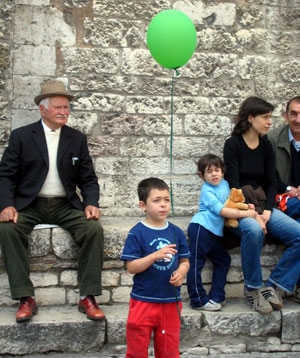 |
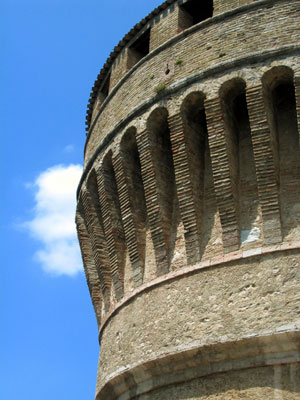 |
The agriturismo gives those unwilling to hike through
mountainous terrain a taste of nature. Agriturismi offer
a range of services and activities from camps and swimming,
to trails and tennis courts. Trails are available for horseback
riding, wandering, and bike rides.
Interesting meals are available at agriturismo sites. Most
locals have their own organic gardens that serve as the
main source of meals served. Health conscious, vegetarian,
and adventurous folks find this concept a great treat.
“We evolve just like the United States,” is
the consensus among many Cagliesi when discussing the antiquated
appearance of the town. Despite the cobblestone streets
and historical buildings, Cagli and the Cagliesi share in
the same fashion, technology, and mentalities of other progressive
countries. “I believe Cagli has opened and become
less isolated than it was five or 10 years ago,” Faggiani
said. When asked if they believe the Cagliesi youth will
leave their hometowns as borderlines become blurred in the
evolution of the EU, Faggiani answered, “Yes, they
will probably leave for awhile, but they always come back.”
|
Photographs by Mary Doyle |
Web design by Dan Rhault |
Video by Jaci Schulte |
|
|






